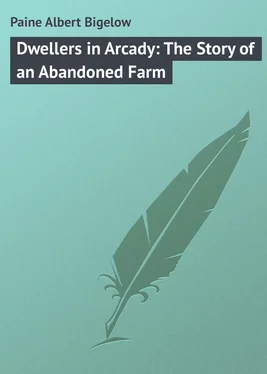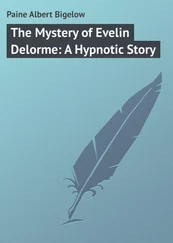Albert Paine - Dwellers in Arcady - The Story of an Abandoned Farm
Здесь есть возможность читать онлайн «Albert Paine - Dwellers in Arcady - The Story of an Abandoned Farm» — ознакомительный отрывок электронной книги совершенно бесплатно, а после прочтения отрывка купить полную версию. В некоторых случаях можно слушать аудио, скачать через торрент в формате fb2 и присутствует краткое содержание. Жанр: foreign_prose, на английском языке. Описание произведения, (предисловие) а так же отзывы посетителей доступны на портале библиотеки ЛибКат.
- Название:Dwellers in Arcady: The Story of an Abandoned Farm
- Автор:
- Жанр:
- Год:неизвестен
- ISBN:нет данных
- Рейтинг книги:3 / 5. Голосов: 1
-
Избранное:Добавить в избранное
- Отзывы:
-
Ваша оценка:
- 60
- 1
- 2
- 3
- 4
- 5
Dwellers in Arcady: The Story of an Abandoned Farm: краткое содержание, описание и аннотация
Предлагаем к чтению аннотацию, описание, краткое содержание или предисловие (зависит от того, что написал сам автор книги «Dwellers in Arcady: The Story of an Abandoned Farm»). Если вы не нашли необходимую информацию о книге — напишите в комментариях, мы постараемся отыскать её.
Dwellers in Arcady: The Story of an Abandoned Farm — читать онлайн ознакомительный отрывок
Ниже представлен текст книги, разбитый по страницам. Система сохранения места последней прочитанной страницы, позволяет с удобством читать онлайн бесплатно книгу «Dwellers in Arcady: The Story of an Abandoned Farm», без необходимости каждый раз заново искать на чём Вы остановились. Поставьте закладку, и сможете в любой момент перейти на страницу, на которой закончили чтение.
Интервал:
Закладка:
I had thought the old collection of value only as kindling, but as we brought out one selection after another I realized my error.
"That," said 'Lias Mullins, "is Uncle Joe's pork-barrel. It's wuth a dollar fifty new, an that one's better 'n new."
"I used to help Uncle Joe kill, every year," nodded Old Nat, "an' to put his meat away. I remember that bar'l as well as can be. I'll take it myself, if you don't want it.
"Better keep your barrel," Westbury said. "You'll be wanting a pair of pigs next, and then you'll need it." He looked into it reflectively and sounded it with his foot. "Many a good mess of pork that old barrel's had in it," he said.
The board's ruling being unanimous, the barrel was set aside. Uncle Joe's ham-barrel came next, and was likewise recognized, carefully examined, and accepted by the board. Then two cider-barrels, which awoke an immediate and special interest.
For cider is the New England staple. Its manufacture and preparation are matters not to be lightly dismissed. Good seasoned cider-barrels have a value in no way related to cooperage. It is the flavor, the bouquet, acquired through a tide of seasons, from apples that grow sweet and rich through summer sun and shower and find a spicy tang in the first October frost. Gathered and pressed on the right day; kept in the right temperature, the mellow juice holds its sweetness and tone far into the winter, and in the oaken staves leaves something of its savor to the contents of another year.
"That's the best cider-cellar I know of," said 'Lias Mullins, "and Uncle Joe allus had the best bar'ls; but they wa'n't used last year, an I'm turrible 'fraid they've gone musty."
"Shouldn't be su'prised," agreed old Nat, mournfully. "An' it's a great pity."
"Bet you a quarter apiece they're as sweet as ever," proposed Chairman Westbury. He took out a great jack-knife and carefully pried out the bungs. "Smell 'em, 'Lias," he said, yielding precedence to the oldest member.
'Lias Mullins carefully steadied himself with his cane, bent close to the bung-hole of one of the barrels, and took a long and apparently agreeable whiff. Then after due preparation he bent close to the other bung-hole and took another and still longer whiff.
"Seems to me that one's just a leetle bit musty," he said.
"Now, Nat, it's your turn," said Westbury.
Whereupon old Nat, gravely and after due preparation, took a long whiff of first one barrel, then a still longer one of the other barrel.
"Seems to me it's t'other one that's a leetle trifle musty," he said.
W. C. Westbury took two short business-like whiffs at each bung.
"Sweet as a nut, both of 'em," he announced, definitely.
That settled it; Westbury was acknowledged authority. Sam rolled out two vinegar-barrels, both pronounced good. Following there came what seemed at least a hundred apple-barrels, potato-barrels, turnip-barrels, ash-barrels, boxes, benches, sections of shelving, and a general heap of debris, some of it unrecognizable even by 'Lias Mullins, oldest member of the board.
"It was a Meeker habit to throw nothing away," commented Westbury, as he looked over the assortment. "No matter what it was, they thought they might want it, some day. You'll find the same thing when you get to the attic."
At this moment Sam discovered in a dark corner a heap of flat slabs that, brought to light, proved to be small tombstones. Westbury grinned.
"Those were put over the cemetery fence," he said, "whenever the relatives bought bigger ones. Uncle Joe brought a lot of them home to cool his milk on."
I looked at them doubtfully. They were nothing but stones, and they had served their original purpose. Still, it had been a rather particular purpose and they were carved with certain names and dates. I was not sure that their owners might not sometime – some weird fall evening, say – take a notion to claim them.
They opened the door of history to Westbury. He began to recall connections and events, and related how a certain Hezekiah Lee, whose name was on one of them, had decided, some fifty years before, to give up farming and go to counterfeiting. His career from that moment had been a busy one; he had been always traveling one way or the other between affluence and the penitentiary. His last term had been a long one, and when he got out, styles in national currency had changed a good deal and Uncle Hezekiah couldn't seem to get the hang of the new designs. So he took to preaching, and held camp-meetings. He lived to be eighty-seven, and people had traveled forty miles to his funeral.
I said I would keep Uncle Hezekiah's headstone. In the end we made an inside walk of the collection, for the old cellar had a dirt floor and was not always dry, but we laid them face down. When we had raked and swept, and brushed and put back the articles accepted by the board, and all was trim and neat, Westbury looked in.
"Looks nice," he said, and added, "that's what you've got now, but by and by you'll have your mess of old truck, too, and the next man will cart a lot of it to the wood-pile, just as you're carting it now."
I said I thought we would begin our career with a coat of whitewash. Westbury noticed something sticking out from an overhead beam, and drew out a long-handled wrought-iron toasting-fork. Looking and prying about, we discovered an old pair of brass snuffers, and a pair of hand-made wrought-iron shears. The old things were pretty rusty, and I could see that Westbury did not value them highly, but I would not have traded them for the pork-barrel and the ham-barrel and all the other barrels and benches reserved from Uncle Joe's collection. 'Lias Mullins, inspecting them, became reflective:
"Them's from away back in old Ben Meeker's time," he said, "or mebbe furder than that. The' ain't been no scissors made by hand in this country since my time, an' a good while before. I guess old Ben was a good hand to have things made. I've heard my father tell that when he was a boy Cap'n Ben, as they called him, one day found his door-sill split, an' went to the blacksmith shop an' had one made out of iron. Father said it was a big curiosity, and everybody went to look at it. That would be fully a hundred years ago, when the' wasn't so much to talk about. He said that the biggest piece of news in Brook Ridge for a good while was that Cap'n Ben had an iron door-sill. It was around there at the side door. I've seen it many a time, an' for all I know it's there yet."
We went around there. Sure enough! Cap'n Ben's iron door-sill was still in place. Brown at the ends, bright and thinner where the step came, it remained as firmly fixed as when, a hundred years before, it had supplied the latest bit of gossip to Brook Ridge.
III
The thought of going back to "six rooms and improvements"
Peace of mind is a fleeting thing. We began to be harassed with uncertainty – to suffer with indecision. In buying the old house we had not at first considered making it a year-round residence, but merely a place to put some appropriate furnishings, the things we cared for most, so that we might have them the best part of the year – from April, say, to Thanksgiving. It had not occurred to us that we would cut loose altogether from the town – dynamite our bridges, as it were – and become a part and parcel of Brook Ridge.
Every day, neighbors stopped to make our acquaintance and learn our plans. We interested them, for we were the first new-comers for many a year to that neglected corner of the township. They were the kindest people in the world, moved, perhaps, less by curiosity than by concern for our comfort and happiness. They generally wanted to know how we liked our place, what changes we were going to make in it, and they never failed to ask if we intended to make it our home or merely a place for summer-time.
Читать дальшеИнтервал:
Закладка:
Похожие книги на «Dwellers in Arcady: The Story of an Abandoned Farm»
Представляем Вашему вниманию похожие книги на «Dwellers in Arcady: The Story of an Abandoned Farm» списком для выбора. Мы отобрали схожую по названию и смыслу литературу в надежде предоставить читателям больше вариантов отыскать новые, интересные, ещё непрочитанные произведения.
Обсуждение, отзывы о книге «Dwellers in Arcady: The Story of an Abandoned Farm» и просто собственные мнения читателей. Оставьте ваши комментарии, напишите, что Вы думаете о произведении, его смысле или главных героях. Укажите что конкретно понравилось, а что нет, и почему Вы так считаете.












